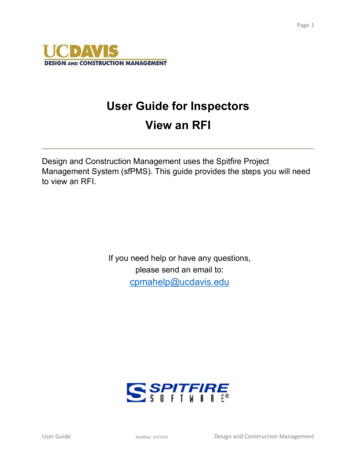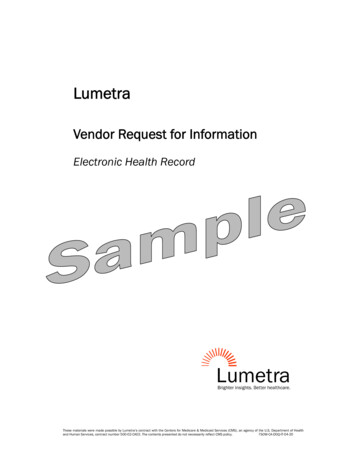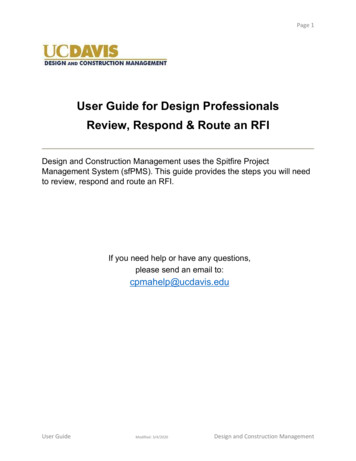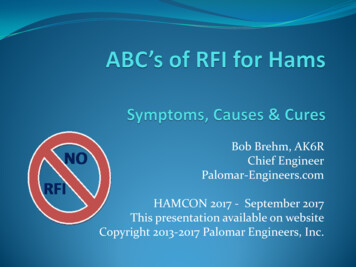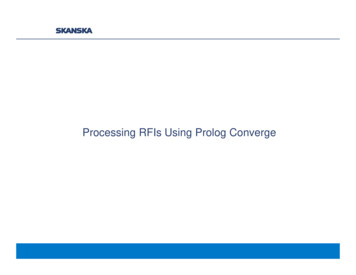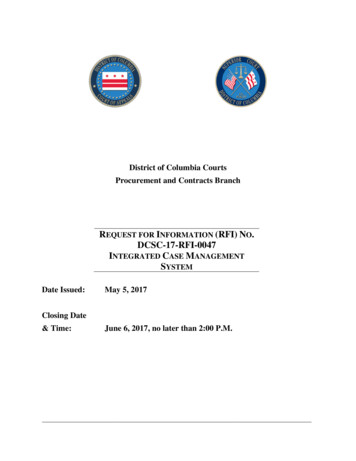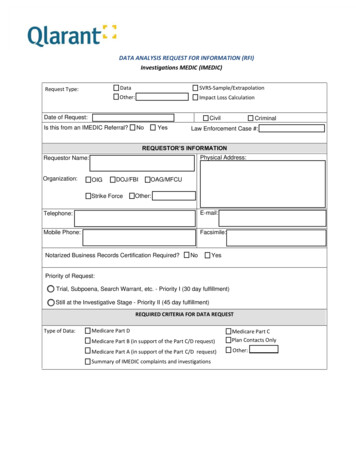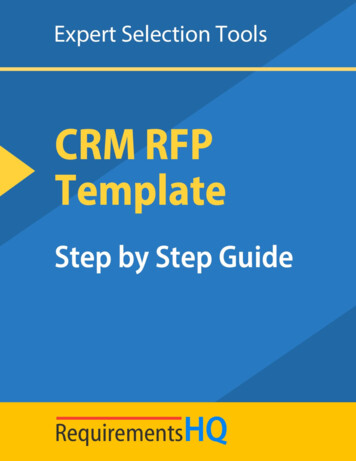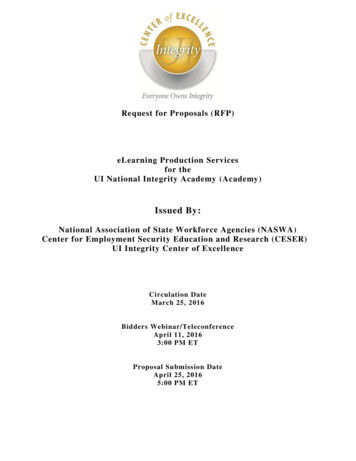
Transcription
Request for Proposals (RFP)eLearning Production Servicesfor theUI National Integrity Academy (Academy)Issued By:National Association of State Workforce Agencies (NASWA)Center for Employment Security Education and Research (CESER)UI Integrity Center of ExcellenceCirculation DateMarch 25, 2016Bidders Webinar/TeleconferenceApril 11, 20163:00 PM ETProposal Submission DateApril 25, 20165:00 PM ET
eLearning Production Services1.IntroductionThe Unemployment Insurance Integrity Center of Excellence (Center) provides innovative tools,training and support to states in their effort to reduce improper payments and combatunemployment insurance fraud. As part of this effort, the Center is developing the UI NationalIntegrity Academy (Academy), which will include comprehensive, certificated educational andtraining programs in the areas of unemployment insurance integrity, operations, fraudinvestigation, data analytics, and program leadership.The Center is looking for an eLearning production firm to support the delivery of the Academycurriculum by developing multiple eLearning lessons in Articulate Storyline. The Academy’sInstructional Design Team will provide lesson design documents, storyboards, and much of thefinished imagery. The Academy staff will work closely with the selected firm to developengaging and interactive eLearning lessons. These lessons will be uploaded to the Academy’slearning management system (LMS), where they will be accessed by unemployment insuranceprogram staff across the country.2.BackgroundOver-payments, errors and instances of fraud within the Unemployment Insurance (UI) programhave been long-standing concerns for Congress, the Office of Management and Budget, the U.S.Department of Labor (USDOL) and state administrative agencies. To address these concerns,the USDOL and states have initiated multiple strategies and initiatives designed to reduce therisk of over-payments and prevent fraud.In 2012, USDOL selected the New York Department of Labor (NYSDOL) to lead thedevelopment of the Center which is charged with developing “innovative UI program integritystrategies to reduce improper payments, prevent and detect fraud, and recover any improperpayments made.” (UIPL 28-12)The NYSDOL has contracted with the NASWA’s Center for Employment Security Education &Research (CESER) to implement the Center and its key strategies. One of the significantstrategies identified is the development of an on-going process to train state staff in thedetection/prevention of UI fraud and the reduction of other types of overpayments. Significantinput from UI program stakeholders has identified the need to develop a comprehensive trainingprogram to be offered by the Center.P a g e 2
eLearning Production Services3.Scope of ServicesProject DescriptionThe Center is dedicated to providing high quality integrity-related training programs andmaterials to state administrative agencies through a series of certificate programs. Thecertificates that this RFP covers are: UI Operational Integrity - Provides detailed training on the common causes and theprevention of improper payments.UI Program Leadership - Provides training to new and emerging leadership staff inestablishing a culture of “Everyone Owns Integrity” within state UI programs.Note: An additional certificate in UI Data Analytics will be added later. UI Data Analytics isnot covered in the Firm Fixed Price (FFP) at this time; however a FFP quote for that additionaleLearning certificate may be requested as a modification to the contract awarded under this RFP.It is anticipated that the UI Data Analytics curriculum will be similar in size to the ProgramLeadership curriculum.See Attachment B for a draft breakdown of lessons to be developed.The Academy’s Responsibilities in eLearning DevelopmentUnder the leadership of NASWA’s Lead Instructional Designer (LID), the Academy’sInstructional Design team has collaborated with UI system SMEs to design each of the trainingcertificate programs and individual courses to be offered by the Academy.The Academy has completed a front-end analysis to determine course content and is currentlyengaged in the design phase of curriculum development.The Academy will provide the following to the selected development vendor: Detailed storyboards in MS Word; eLearning graphical user interface (GUI) design, color usage standards, and preliminaryinteraction style standards; An Articulate Storyline 2 source file (.story) containing the GUI design, the navigationalstructure, and example interactivities; Screen templates and interactivity templates that meet the expected level of compliancywith the section 508 amendment to the Federal Rehabilitation Act of 1973; Concept illustrations. There is a full-time illustrator / graphic designer on the Academy’sinstructional design team. See description of required visuals for more details; Specifications that call out the required design treatment for all visuals; Intermittent and final quality reviews for each lesson by the Academy’s instructionaldesigners; and Video files which may be incorporated into the lessons and a streaming platform(Vimeo). At this time a minimal amount of video is expected. Expect 5 to 10 minutes ofP a g e 3
eLearning Production Servicesvideo clips converted to the required video format. Video clips will be provided by theAcademy. Production of video clips will not be a responsibility of the successful vendorunder this RFP.4.Vendor Performance Requirements and eLearning SpecificationsAs part of its Technical Response, the vendor is asked to describe its capabilities and experiencein meeting the specifications called out in this eLearning Specifications section of the RFP.Please briefly address your capabilities as they relate to the following specifications:Interactivity LevelsSimple Interactivities (Level 1)Basic knowledge checks that include text-based multiple-choice; multiple-select; drop-downmenu select; and true/false questions; and simple layered screens, i.e. a paragraph of textdisplaying upon clicking a screen object.Moderately Complex Interactivities (Level 2)Custom drag and drop; line draw matching; multiple click and reveals on one screen, i.e. clickingtabs to view additional information upon each tab click; more complex screen animations thatinclude multiple screen elements and/or a detailed base diagram). Level 2 does not require logicbut may contain layered screens requiring multiple key presses or multiple layers that arerevealed on the same screen.Complex Participation Interactivities (Level 3)Interactions may include tasks that emulate real job performance, for example scenario-basedaudio/video exercise to teach and strengthen soft skills, and performing specific supervisorytasks based on information presentedThe Level-3 activities are presented as case studies. There is no extensive branching norcomplex logic paths within the Level-3 case studies. There will be at least two types of Level-3Interactivities. Each type of Level-3 interactivity will be reused multiple times (each reuserequiring different graphics). The interactivities will allow exploring of content elements on thescreen and questions will be asked that lead the learner down a somewhat linear path. Thescreen design and illustrations for Level-3 interactivities will be provided by the Academy. Thevendor will need to provide some limited graphical design work, in the form of sizing images orpiecing together the imagery for the Articulate authors.Level-3 interactivities include: A case study, including audio clips, so learners can query individuals within a scenario,access related information, and then make decisions based upon their informationgathering. Level-3 interactivities with audio will include (12) 15-second audio clips(character voices) that vendor must create using 2-4 non-professional actors.(Professional sound studio not necessary.)P a g e 4
eLearning Production Services Another activity, also in a case study format, will provide materials, including PDF-basedinformation accessed from the eLearning, and will ask learners to make decisions about ascenario based on the information they have reviewed.A. Reusable InteractivitiesAn Articulate Storyline source file containing programmed interactivities/exercises to be used astemplates will be provided to the vendor. Interactivities/exercises will need to be created by thevendor and are likely to be reused multiple times. See “Other Labor” paragraph under ProjectPricing for the number of new interactivities that the vendor is expected to create. Interactionsshould be templated and shared across the vendor’s developers, to discourage re-coding fromscratch, thereby saving time, retaining a consistency for the learner experience, and providingeasier maintenance of content updates in the future.B. ProgrammingThe Graphical User Interface (GUI) and navigation are standard Articulate Storylinefunctionality. There is a GUI for lessons and a different GUI for tests. Each lesson requires itsown glossary and reference list. A minimal amount of custom programming, e.g. in JavaScript,will be required, however more advanced programming services should be available for problemsolving, if needed. If used, advanced programming services may be added onto the price as achange order.C. GraphicsThe Vendor will be expected to provide up to five licensed stock photographs per lesson. TheAcademy will provide up to ten additional licensed photographs from its stock photosubscription. Vendor will apply Academy-designated graphical treatments to all licensedphotography from stock photo libraries as well as to concept graphics provided by the Academy.Image treatments are called out in the treatment specifications provided by the Academy.Concept graphics provided by the Academy may need to be resized or have a pre-definedtreatment applied. Visuals such as flow charts, hierarchies, and geometric shapes shall beeditable, as opposed to fixed imagery, such as .jpg or .png. It is recommended that these types ofvisuals be created using Articulate Storyline’s built-in drawing capabilities; if imagery is createdwithin PowerPoint and imported, vendor must demonstrate that the imagery is editable.D. Audio and VideoVideo files, if any, will be provided by the Academy. Audio within the lessons will be limited toareas where interactive scenarios may require conversations among actors. The vendor will berequired to provide clear and distortion free audio clips using non-professional voices.Professional sound studio recording is not required. Minutes of audio will not exceed sixtyminutes across all lessons and will used primarily in Level-3 interactivities. Audio recordingshould be listed as a separate line item on the cost estimate.P a g e 5
eLearning Production ServicesE. StoryboardsIt is the responsibility of the vendor to keep storyboards current with the online screens duringthe development process and throughout all review cycles. Storyboards are under versioncontrol on the Academy’s SharePoint project management portal. Vendor will be expected tomaintain version control within SharePoint portal. Vendor must copy and paste fromstoryboards into Articulate Storyline screens, rather than retype text onto screens.F. Project Design Documents, Style Guides, and Project SpecificationsInitial drafts of these documents will be provided by the Academy. These will be livingdocuments. The vendor is expected to adhere to guidelines called out in the document and add tothe documents, as needed, during the development lifecycle. These documents will be underversion control in the project management portal. At the advice of the vendor, the Academywould be willing to use a wiki or other method of communicating style updates to thedevelopment team and Academy staff.G. Section 508 CompliancyAll eLearning lessons and associated print documents and handouts shall comply with Section508 Amendment of the Federal Rehabilitation Act of 1973. The Vendor must adhere to the levelof compliancy as provided in the Articulate Storyline file created and provided to the vendor bythe Academy. As part of Quality Assurance, the vendor is expected to test the ability to movethrough each lesson without requiring a mouse and to adjust and test tab order within each screen.In the vendor’s technical response, the vendor should describe its plan on testing lessons using ascreen reader, such as JAWS. Vendor shall also describe its experience in creating Section 508compliant courseware.H. SCORM ConformanceThe vendor is required to work in cooperation with Academy to implement and test SCORMfunctionality of vendor-developed lessons within the Academy learning management system(LMS). This includes but is not limited to passing scores and completion data. The existingAcademy LMS, ShareKnowledge, uses a SharePoint infrastructure and requires SCORM 2004,edition 4. Vendor should state its experience in creating SCORM-conformant courseware. Inaddition to its Articulate Storyline authors, the vendor shall have a programmer available totroubleshoot any SCORM conformance issues in communicating with the Academy LMS. Theprogrammer would work in conjunction with Academy LMS programming personnel. (To date,courseware produced using Articulate Storyline has been running error free within the AcademyLMS.)I. Required Development Platform and Application SoftwareThe eLearning authoring is designated as Articulate Storyline 2.0 or the most current versionavailable at the time of development. Should there be an Articulate upgrade after some lessonshave been created, those lessons will need to be upgraded. The vendor will be asked to providean estimate for the cost of the republishing and quality assurance labor necessary for updatingP a g e 6
eLearning Production Serviceslessons that have already been developed under this contract. This estimate will be providedunder separate cover and viewed as a change order.The vendor is responsible for providing its own development licenses of the Articulate softwareand all computer hardware necessary to develop the eLearning. Development must be performedon equipment using a Microsoft operating system. A Mac running Windows applications is notacceptable. The vendor must be using Microsoft Office 2010 or 2013. Converting to and fromprior versions of Office is not acceptable. Software application(s) used to document reviewcomments and requests during review cycles, e.g. Microsoft Excel, SmartSheetwww.smartsheet.com, or defect management software (DMS), should be noted within thetechnical response and discussed with Academy personnel upon project award.J. Project Management SoftwareThe vendor will be required to use the Microsoft SharePoint implementation provided by theAcademy. This will be at no cost to the vendor. All project files will be stored on SharePointand will be under document version control. If the vendor prefers to use its own projectmanagement portal, please describe that platform and discuss how you use it within yourdevelopment process.K. Staging EnvironmentVendor must have ability to post lessons on the vendor’s secure servers for Academy reviewcycles.L. Quality AssuranceThe vendor is responsible for providing multiple quality assurance cycles. Some of those reviewcycles will include Academy reviews, up through the final client review.The vendor is expected to perform internal QA reviews to minimize the effort of Academy staff,these internal reviews should include, but not be limited to ensuring: Storyboard content is accurately conveyed to the to the programmed lessons screens;All navigation is functioning correctly;Links are active;All imagery has been treated as described in the project style guide;Items do not shift from screen to screen;Section 508 compliancy, e.g. moving from screen to screen and within screens withoutrequiring use of the mouse;Bullet points and other screen elements are properly formatted according to the projectstyle guide; andAll objective screens, summary screens, and other common screens are consistent acrosslessons, as indicated in the project style guide.P a g e 7
eLearning Production ServicesThe vendor is required to provide a quality review checklist for each review cycle and will posteach completed check list on the project management portal. To assist in review cycles,Articulate Storyline lessons published for review cycles should include screen numbers that mayneed to be manually inserted into the lessons. Screen numbers will be removed from lessonsprior to launching final versions for learners. The Vendor is required to discuss a solution forpage numbering with Academy staff after project award. As part of the technical response, thevendor shall provide a description of its quality assurance process.M. Delivery PlatformThe primary delivery platform for the courseware will be PC-based. The vendor will not berequired to optimize for mobile platforms nor test on mobile platforms.5.Project ManagementAs part of its Management Response, the vendor is asked to describe how it plans to manage thedevelopment process of the multiple lessons called out in this RFP. What project managementroles are employed by the vendor? For example, is there solely a project manager, or do you alsoincorporate a production manager or a development team manager?Indicate how you calculate the number of labor hours required for project management roles andhow many hours of project management roles you are allocating across the development cycle ofall lessons.See Attachment C, Project Plan Outline, for a description of the project plan the vendor will beexpected to provide as a deliverable after project award.During the development project, the vendor will be required to conduct Weekly ProgressMeetings and provide Weekly Progress Reports, and Monthly Status Reports.P a g e 8
eLearning Production Services6.Vendor DeliverablesDeliverables required as part of the project award:1. Project Plan (see Attachment C).2. Project Development Production Schedule.3. Quality Assurance Checklists.4. Delivery of one draft lesson, allowing Academy personnel to approve the lesson thougheach stage of the development cycle. Lesson SCORM functionality will be tested withinthe Academy’s LMS. Academy personnel will confirm Section 508 compliance.5. Incremental delivery of lessons for each stage of required Academy review, including40 total lessons which comprise: 6 simple eLearning lessons containing Level-1 interactivities;19 medium-level eLearning lessons containing Level-1 and Level-2 interactivities;5 advanced-level eLearning lessons containing Level-1, Level-2, and Level-3interactivities; and10 eLearning-based tests.See the scope of these lessons defined in section 8. Project Pricing of this RFP.6. Final published files, including HTML5 output and SCORM 2004, edition 4 zip files.7. Updated project specifications and style guide on Academy SharePoint portal. Originaldraft documents to be provided by the Academy.8. Updated Accessibility document describing how all lessons comply with Section 508Amendment to the Federal Rehabilitation Act of 1973. Original draft Accessibilitydocument to be provided by the Academy.9. Final storyboards, updated to match published lessons.10. All published Articulate Storyline files, all Storyline source files, all unflattened mediafiles (e.g. PhotoShop, .psd, files), all source audio files (if audio is used), all other sourcefiles used in the development of lesson files.P a g e 9
eLearning Production Services7.Project Scope and Preliminary Delivery ScheduleProject Period of Performance is from the award date until August 31, 2017. All completedeLearning is to be delivered by August 15, 2017. Piloting and revisions resulting from pilotswill take place by module, on a rolling basis. For example, when one complete module withmultiple lessons and a certification test is completed, the entire module will roll out to theLMS. The Academy will be responsible for staging pilot testing.TaskDeliverableFormatCalendar DaysAfter Project Start1aComprehensiveProject PlanDescribed in Attachment C plussupporting documents (Contractordetermined format)451bFully-developed productionscheduleMS Project or Excel(Contractor-determined format)601cOngoing Progress ReportsWeekly Progress ReportsMonthly Status Reports2Draft of first beta eLearninglesson for review and to testwithin the Academy LMSArticulate Storyline Published file3Delivery of 39 eLearninglessons for review andapproval by the AcademyArticulate Storyline Publishedfiles per Approved DevelopmentSchedule and QA PlanIncremental deliverywith last delivery byAugust 15, 20174All 40 revised lessonsdelivered after pilot testperiod and modificationsArticulate Storyline PublishedfilesIncremental deliverywith last delivery byAugust 31, 20175All source filesBefore final paymentP a g e 10As Required90After August 31, 2017
eLearning Production Services8.Project PricingThis project is a Firm Fixed Price (FFP) deliverables based contract. The price quoted shall beall-inclusive. Note: the cost estimate should include a full buildup of costs and rates used toestablish the FFP cost estimate. This cost estimate should include; 1) the labor breakdown foreach of the three eLearning lesson types described below, and 2) the hours of projectmanagement required for all lesson development.Additionally, vendors should provide a breakdown describing the number of hours per laborcategory calculated to complete one of each of the three types of lessons, excluding projectmanagement roles. Lessons must be developed to the specifications called out in this RFP.Other Labor: Other labor will be incurred by the vendor for services not called out within thethree lesson types you are being asked to estimate. The following services should be included inyour overall FFP estimate: All project management activities; Development of 10 new level-2 interactivity types; Audio files (see volume of audio and audio specs discussed in earlier section).Simple eLearning Lessons containing Level-1 InteractivitiesQuantity 7Each lesson contains 60 screens, consisting of: 10 text-only screens;5 screens containing concept graphics from Academy – visual treatment to be appliedaccording to style guide;5 screens containing photographs to be provided from vendor-licensed stock photolibrary – visual treatment to be applied according to style guide;10 screens containing photographs to be provided from Academy-licensed stockphoto library – visual treatment to be applied according to style guide;15 screens requiring click-to-reveal or static visual designed using the ArticulateDraw feature. Must follow visual treatment described in project style guide; and15 screens Level-1 interactivities (unscored knowledge checks) where templates havebeen provided by Academy or have been created by the vendor. (See description ofInteractivity levels, and see Other Labor, above.)Medium-level eLearning Lessons containing Level-1 and 2 InteractivitiesQuantity 19Each lesson contains 60 screens, consisting of: 10 text-only screens;5 screens containing concept graphics from Academy – visual treatment to be appliedaccording to style guide;5 screens containing photographs to be provided from vendor-licensed stock photolibrary – visual treatment to be applied according to style guide;P a g e 11
eLearning Production Services 10 screens containing photographs to be provided from Academy-licensed stockphoto library – visual treatment to be applied according to style guide;10 screens requiring click-to-reveal or static visual designed using the ArticulateDraw feature. Must follow visual treatment described in project style guide; and10 screens Level-1 interactivities where templates have been provided by Academy10 screens of Level-2 interactivities where templates have been provided byAcademy or previously created by the vendor for this project.Advanced-level eLearning Lessons containing Level-1,-2,-3, Interactivities Quantity 5Each lesson contains 60 screens, consisting of: 10 text-only screens;5 screens containing concept graphics from Academy – visual treatment to be appliedaccording to style guide;5 screens containing photographs to be provided from vendor-licensed stock photolibrary – visual treatment to be applied according to style guide;10 screens containing photographs to be provided from Academy-licensed stockphoto library – visual treatment to be applied according to style guide;10 screens requiring click-to-reveal or static visual designed using the ArticulateDraw feature. Must follow visual treatment described in project style guide;10 screens Level-1 interactivities where templates have been provided by Academy;8 screens of Level-2 interactivities where templates have been provided by Academyor previously created by the vendor for this project; and2 Level-3 activities where vendor customizes an Academy template for a Level-3interaction.eLearning-Based TestsQuantity 10Each lesson contains 60 screens: Each test will contain 3 banks of 20 questions that will be multiple choice, multipleselect, and true/false. Only one bank of questions will be presented to any one learner.Each bank will contain different questions than the other banks.Distractors will be required to be randomized upon publication, but for reviewpurposes, the questions and distractors will not be randomized.Questions may contain static visuals. Visuals for questions, if any, will be providedby Academy. Question results must be passed to the Academy learning managementsystem using SCORM calls provided by Articulate Storyline functionality.The GUI for testing will differ from the eLearning GUI and will be provided byAcademy, in the form of an Articulate file that may be used as a template.Request for Technique to Handle Scope VariationThe vendor is also asked to provide a suggestion or preference for judging scope variations afterthe award of the contract. Some lessons may be shorter and less complex, while others may beP a g e 12
eLearning Production Serviceslonger than described within this RFP. The vendor will have a chance to review each storyboardbefore development and estimate its scope compared to the scope of the lessons defined withinthe RFP. The goal is to reach an agreed upon method, which is not onerous for the vendor or forAcademy, but that allows the vendor to deliver an equal scope of content to that which is bidwithin the vendor’s RFP response. Should the overall scope of work exceed what has beenagreed upon, the vendor will be asked to submit a change order for the additional eLearningdevelopment. The vendor’s response to this question with this RFP will not be part of theconsideration for contract award.9.Vendor QualificationsVendors must demonstrate extensive experience in eLearning production for similar large-scaleprojects. Though not specifically required, the ideal vendor would be able to demonstrate priorwork on a national level. Also, vendor experience in using Articulate Storyline is preferred.Vendors must have adequate dedicated staffing assigned to the project including a primary pointof contact for the duration of the project.Other Desired Experience, Skills and Abilities include: 10.Experience developing custom eLearning, specifically in Articulate Storyline;Experience creating professional-looking graphics using Draw feature withinPowerPoint or Articulate Storyline;Experience using Microsoft Office applications and Adobe graphic developmentsoftware;Experience in creating interactive exercises;Experience in creating eLearning from detailed storyboards;Project management experience for eLearning development;Experience in creating digital audio files;Adherence to compliance standards such as SCORM and Section 508 of the FederalRehabilitation Act of 1973;Experience in secure staging of eLearning for online client reviews;Use of a versioning system for sources files;Use of a project management portal;Quality assurance which ensures the content and functionality performs as expected; andAbility to provide work samples including developed eLearning lessons.Software and Hardware RequirementsVendors must possess the necessary software, equipment, office materials and other toolsnecessary produce assigned eLearning lessons. Please refer to sections J and K of the eLearningSpecifications for detailed information about required software.P a g e 13
eLearning Production Services11.Place of PerformanceWork for this task will be performed off-site at the vendor’s location. Most meetings andactivities can be managed through conference calls and webinars.12.TravelTravel for the selected vendor will occur at the vendor’s expense. Occasional travel may benecessary to attend meetings with Academy project staff. A maximum of three (3) projectreview meetings will occur during the lifetime of the contract. These meetings shall occur in SanDiego, CA and each meeting is expected to last no longer than 1-2 days in duration.13.Estimated Project TimelineThe period of performance for this project will be variable depending upon the assignedcurriculum and complexity of the courses to be developed. Contracts will be written to includeextension options. The extension options are designed to ensure continuity. It is anticipated thatthe eLearning production work will be completed by May 1, 2017. If additional courses are added,those courses will also be delivered by August 31, 2017. Additional courses will be bid separately.The following table shows an estimated delivery schedule for the training modules.UI Program Leadership ModulesNumber ofLessonsNumber ofAssessmentsEstimated ModuleDelivery DateStrategic Leadership in UI Operations11June 2016Assessing the UI Environment21Sept. 2016Prioritizing UI Integrity Strategies21Dec. 2016UI Integrity Funding31April 2017UI Operations Integrity ModulesNumber ofLessonsNumber ofAssessmentsEstimated ModuleDelivery
Production of video clips will not be a responsibility of the successful vendor under this RFP. 4. Vendor Performance Requirements and eLearning Specifications As part of its Technical Response, the vendor is asked to describe its capabilities and experience in meeting the specifications called out in this eLearning Specifications section of .

